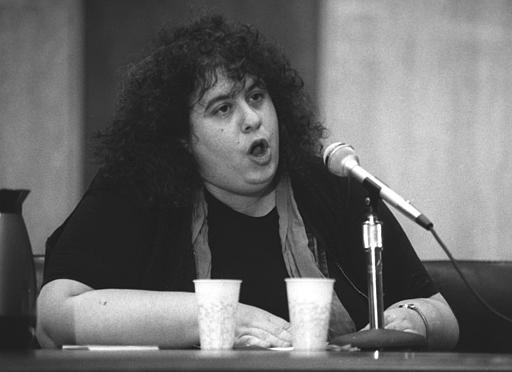In defense of women’s rights, Andrea Dworkin (1946–2005), a radical feminist writer and theorist, launched sweeping attacks on pornography that led to harsh criticism of her by civil libertarians as well as by anti-feminists.
Dworkin was one of the most radical American feminists
Born in Camden, New Jersey, Dworkin attended Bennington College in Vermont. During an anti–Vietnam War protest march in New York City, she was arrested and subjected to a violent and humiliating body cavity search by two male policemen.
In 1969 she moved to Europe, where she suffered through an abusive marriage. Perhaps influenced by these experiences, upon her return to the United States in 1972 she established herself as one of the foremost, and most controversial, radical feminist voices.
Dworkin believed pornography encouraged violence against women
Dworkin is best known for her strident opposition to pornography, which she defined in Pornography: Men Possessing Women (1981) as “a celebration of rape and injury to women.”
She campaigned tirelessly against pornography, rejecting free-speech defenses and arguing that it perpetuated male domination, encouraged violence against women, and made women into second-class citizens, in violation of their equal rights.
Working with law professor Catharine MacKinnon, Dworkin drafted a law that defined pornography as sexually explicit materials depicting women as dehumanized objects to satisfy men’s desires and that allowed those harmed by pornography to file civil suits against its makers and distributors.
Court overturned Dworkin’s anti-pornography ordinance on First Amendment grounds
Indianapolis adopted the proposed ordinance, but the Seventh Circuit Court of Appeals, in American Booksellers Association v. Hudnut (7th Cir. 1985), ruled that it was an unconstitutional violation of the First Amendment.
Dworkin was also an important witness before the Attorney General’s Commission on Pornography (the Meese Commission) in 1986.
In her testimony, she attacked pornography and urged prosecutors to use anti-racketeering statutes against pornographers. She explained that she opposed obscenity laws on the grounds that they were ineffective and “woman-hating in their very construction. Their basic premise is that it’s women’s bodies that are dirty.”
Dworkin provocatively expressed her views
The controversy over Dworkin’s work stems from her radical views and her provocative expression of them.
She wrote that a rape victim should be allowed to personally execute her attacker and famously that “[intercourse] is the means by which the male colonizes the female.” (She did not, however, claim that all heterosexual intercourse is rape, a statement that is often attributed to her.)
Amid equally passionate supporters and detractors, Dworkin crusaded for women’s rights throughout her life. In addition to her individual writings, she co-authored, with Catharine MacKinnon, Pornography and Civil Rights: A New Day for Women’s Equality (1987) and In Harm’s Way: The Pornography Civil Rights Hearings (1998).
This article was originally published in 2009. Stephen Robertson is an Adjunct Assistant Professor of Political Science and International Relations at Middle Tennessee State University, where he has taught for about 25 years. He has always had a deep interest in constitutional law and the First Amendment and explores these topics in his courses on American government and women’s rights under American law.

